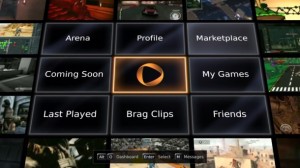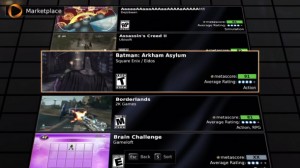 Imagine playing any of the hottest new PC games instantly on a modestly powered desktop you bought a couple years ago. Or playing Crysis, one of the most graphically demanding PC games ever, on a MacBook — or your big screen HDTV. OnLive, a new game streaming service, promises all that and more. I’ve spent the last few days trying out the service, forming impressions on whether this really is as revolutionary as the company says it is.
Imagine playing any of the hottest new PC games instantly on a modestly powered desktop you bought a couple years ago. Or playing Crysis, one of the most graphically demanding PC games ever, on a MacBook — or your big screen HDTV. OnLive, a new game streaming service, promises all that and more. I’ve spent the last few days trying out the service, forming impressions on whether this really is as revolutionary as the company says it is.
OnLive officially launched June 17th for PCs and Macs after an extensive beta testing period. The service streams games, run on powerful servers, to user’s computers, with all the demanding CPU & GPU processing occurring on the server side. All users need is a fast internet connection and a computer built within the past few years to view the games at HD resolution. Currently, a wired ethernet connection is required to use OnLive. While wireless support is coming soon, you’ll still need a relatively fast connection — 5 Mbps minimum — for it to work.
 Currently, two inputs are supported — mouse & keyboard and the Xbox 360 Controller. Every game I tried automatically recognized the Xbox Controller, and changing Graphics Settings was disabled — OnLive wants to take care of all that for you. A MicroConsole TV Adapter will be released that allows gamers to use the service on their HDTVs, and is rumored that it will be free for subscribers, like a cable box. You’ll be able to use either the Xbox Controller or a similar OnLive controller when that launches.
Currently, two inputs are supported — mouse & keyboard and the Xbox 360 Controller. Every game I tried automatically recognized the Xbox Controller, and changing Graphics Settings was disabled — OnLive wants to take care of all that for you. A MicroConsole TV Adapter will be released that allows gamers to use the service on their HDTVs, and is rumored that it will be free for subscribers, like a cable box. You’ll be able to use either the Xbox Controller or a similar OnLive controller when that launches.
Overall, image quality running at 720p is good, veering on great (OnLive plans to upgrade to 1080p once the network infrastructure supports it). There is a slight blurriness compared to playing the game locally on a hard drive, but everything onscreen is legible, and the servers running the games are powerful enough to not slow down when the action gets heavy. I never ran into lag when playing that made me realize I was streaming the game (lag is the delay between you pressing a button or keyboard key and the game responding).
OnLive users the streaming technology in innovative ways that bring the community together. You can record “Brag Clips” of particularly memorable game moments that will be shown to other users. Finally, if you’re tired of playing yourself, the Arena allows you to instantly spectate other gamers playing any of the service’s titles.
 As far as game pricing, there are no real discounts to be found right now. Unlike Valve’s Steam platform, which has frequent sales due to the reduced costs of digital distribution, OnLive’s games average between $39.99 and $59.99 for AAA titles like Just Cause 2 and Assassin’s Creed 2. In addition, OnLive guarantees that they’ll license the game for streaming for two years after its release date — you never actually own the title, and they can remove it after that with no refund.
As far as game pricing, there are no real discounts to be found right now. Unlike Valve’s Steam platform, which has frequent sales due to the reduced costs of digital distribution, OnLive’s games average between $39.99 and $59.99 for AAA titles like Just Cause 2 and Assassin’s Creed 2. In addition, OnLive guarantees that they’ll license the game for streaming for two years after its release date — you never actually own the title, and they can remove it after that with no refund.
In closing: I’m excited about what OnLive could mean for gaming. If its selection grows, discounted games are offered, and already decent image quality is improved, then the service will be a very appealing options for gamers without top of the end gaming PCs that don’t want to make an expensive investment just to play one or two games. I could definitely see this technology becoming indistinguishable from playing locally in just a year or two, and rejuvenate PC gaming in the process.
OnLive is available now for Windows XP, Vista, 7, and Mac OSX Leopard & Snow Leopard. From now until July 15th, gamers can request a beta sign-up for free access to the service for a full year. The second year is $4.95/month. That membership gets you access to free 30 minute demos of most games. Sign-ups can be found at www.onlive.com












This review misses the point. This is a new platform that will soon enable an aggregation that will run game engines that require thousands of times more processing power and memory than would be available locally and instead of needless redundance in keeping millions of small local sized game engines running it will simply serve instances.
This also enbles cell phones that are mobile carrier free, and basically have no GPU/CPU/Memory in exchange for better battery/screen/tranciever.
This technology also makes it possible in the short term to get all content, services and aps for one low fixed generic monthly ad free price, and get it anytime anywhere.
Up to this point the internet was just gestating now it has been born and ironically will start to work in a way closer to the way most people already imagine it. Not seeing this as a sea change is to be lumped in with people who thought the web browser was a thing of questionable utlity and significance. This also means that all the consoles (worst possible distribution model) are instantly obsolete- as we know resolution does not make graphics on screens or cameras and 1080P/3D/Motion were all addressed by Perlman, this stuff can do them and more inspades because the internet can do it.
This technology is also the end of the puffing-sponsorship-lobbying model that makes the capture of politicians possible with its attendant loss of politcal representation and exageration of corporate power.